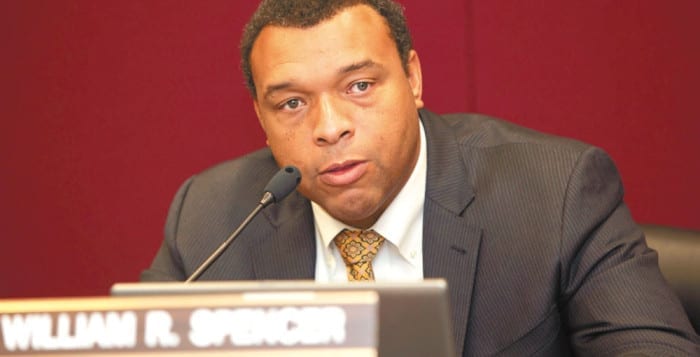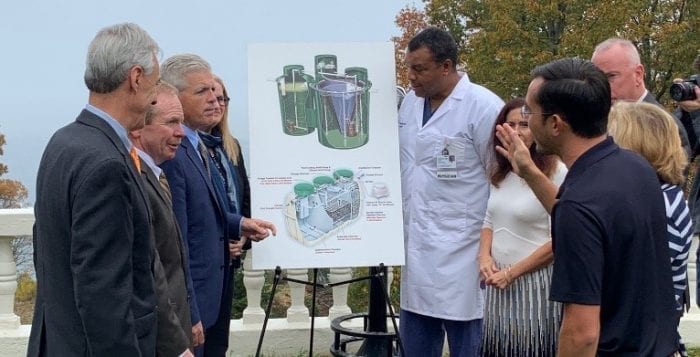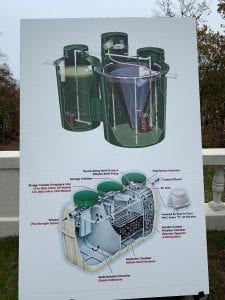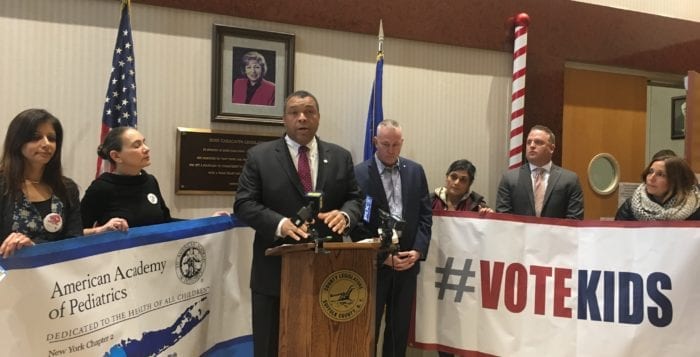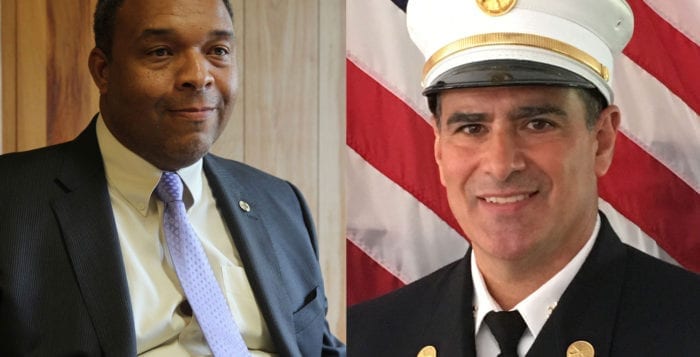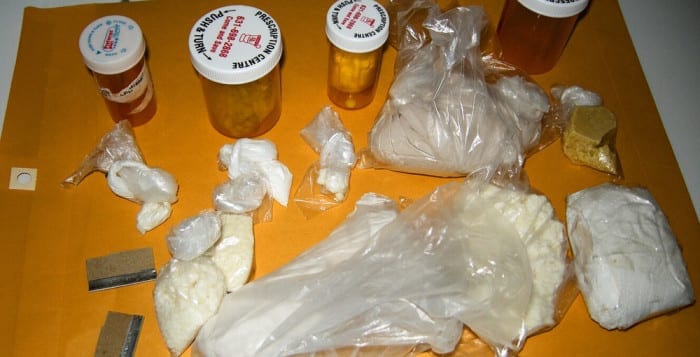*Updated to include information about actions by the Suffolk County legislature.*
Suffolk County Legislator William “Doc” Spencer (D-Centerport) was arrested Tuesday for allegedly attempting to trade oxycodone for sex.
Spencer, who is a legislator for the 18th district and was in a Suffolk County vehicle at the time of the arrest Oct. 20, allegedly planned to meet a prostitute in the parking lot of a Goodwill store in Elwood to trade sex for the pills, which were reportedly oxycodone, a legal form of an opioid. Authorities had arranged a sting operation.
Spencer, who had two oxycodone pills in his possession at the sting operation, is charged with criminal possession of a controlled substance in the third degree, a class B felony, and criminal sale of a controlled substance in the third degree, a class B felony.
Spencer, 53, was arraigned on Wednesday at the John P. Cohalan Jr. Courthouse in Central Islip. The man has been a legislator since 2012 and serves on the county’s opioid task force.
Spencer is due back in court on Feb. 26th. If convicted of the top count, he could face a maximum of up to nine years in prison.
Assistant District Attorneys Kevin Ward and Laura de Oliveira, of the Public Integrity Bureau, are prosecuting the case.
“The message here is that the Suffolk County District Attorney’s Office will continue to work in partnership with all of the law enforcement agencies operating here on Long Island, including the DEA and members of the Long Island Heroin task Force, to hold criminals accountable no matter who they are or what their walk of life is,” Suffolk DA Tim Sini (D) said in a statement.
“Law enforcement officers follow the evidence and this time, the evidence led to a prominent member of the community,” Suffolk County Police Commissioner Geraldine Hart said in a statement.
Spencer was the chief of otolaryngology at Huntington Hospital. In a statement, a Huntington Hospital spokeswoman said Spencer is “not an employed physician at Huntington Hospital but has privileges as a voluntary physician with his own private practice. His privileges at the hospital have been temporarily suspended pending further investigation.”
Spencer is also Associate Clinical Professor at Stony Brook University Hospital. Spencer has not had medical privileges at Stony Brook University Hospital since 2014, a hospital official said.
Spencer runs a private practice, Long Island Otolaryngology & Pediatric Airway in Huntington.
Suffolk County Republican Committee Chairman Jesse Garcia was quick to jump on the news, calling in a release for Spencer to step down “immediately” as a county legislator.
In a statement, Garcia called Spencer’s alleged actions a violation of his oath as a doctor and elected official.
“This alleged act was an attempt to abuse his position of power and trust, prey on women, and take advantage of those he believed were prisoners of addiction,” Garcia said in a statement. “His legislative record of sponsoring dozens of resolutions focusing on health and drug abuse makes this alleged drug-for-sex trade all the more evil, because he clearly knew the consequences of his behavior on his intended victim.”
Suffolk County Legislature Presiding Officer Rob Calarco issued a statement in response to Spencer’s arrest, saying he has stepped down as Democrat majority leader.
Calarco said, “Legislator Spencer has stepped down from his position as Majority Leader of the Legislature’s Democratic caucus. He is also being removed from his post as chair of the Legislature’s Health Committee which subsequently removes him from any assignments linked to that chairmanship, including serving on the Legislature’s Heroin and Opiate Epidemic Advisory Panel.”
“There is nothing in the law that requires a legislator to resign while charges are pending, and while the allegations against Legislator Spencer are serious, he is entitled to his day in court,” Calarco continued. “My colleagues and I remain focused on continuing the business of the people. The Democratic caucus will convene in the future to select a new Majority Leader, and a new health committee chair will be chosen in due time.”
Spencer is married and has three children.
Prior to his arrest, Spencer had been involved in several legislative efforts, including to combat the effects of the opioid epidemic. Spencer proposed a resolution that passed unanimously to make Narcan, which reverses the effects of narcotics, available to policy emergency responders in the Second Precinct.
Spencer had sponsored 35 resolutions, with close to 1/3 of them related to health and safety, including prohibiting smoking at county beaches and county parks. Spencer’s bills include a 5-cent fee for single use plastic bags, which stores started charging in January, 2018.
During his time in office, Spencer had worked to ban the sale of powdered caffeine to minors, raise the age of selling tobacco products, helped pass a measure to stop companies from manufacturing energy drinks to youth and led a ban on flavored e-cigarettes.
Last fall during the run up to his reelection, Spencer told the Times Beacon Record Newspapers he was committed to finding treatment and addiction solutions for people affected by the opioid crisis.
Spencer won reelection in 2019, defeating Republican Garrett Chelius and Independent Daniel West for a seat in a district representing Huntington, Halesite, Centerport, Northport, East Northport, Cold Spring Harbor, Lloyd Harbor among other towns.
An ordained minister, Spencer serves as the Pastor of Willow Manor Fellowship in Centerport.
Spencer was released on his own recognizance. He has to hand over his passport and a legal firearm.
This story was updated to include details about the number of pills Spencer had in his possession, the specific charges, the potential prison sentence if convicted, the names of the attorneys prosecuting the case, and comments from DA Sini and SCPD Commissioner Hart. The update also indicates that Spencer was released on his own recognizance and that Spencer is no longer the chief of otolaryngology at Huntington Hospital.
This story was updated Oct. 22 to update the statement by Rob Calarco.

